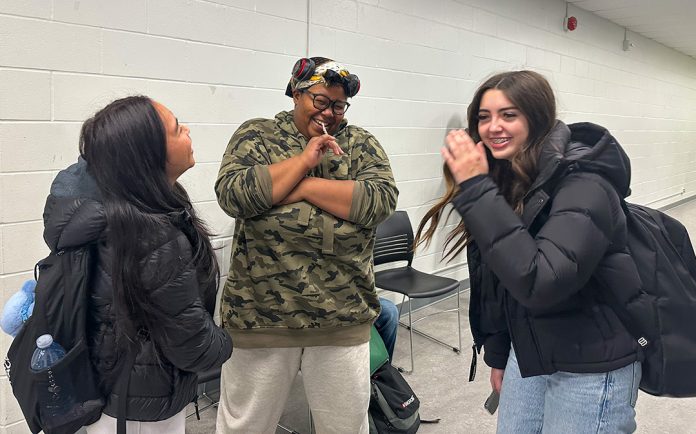The pressures of homework, tests, and not knowing what the future holds can make college a scary experience. Laughter, however, can be an effective medicine and a language that cuts across cultural barriers.
Albert Nerenberg is a laughologist. He examines the difference between humour and laughter.
“Humour is maybe only tens of thousands of years old in terms of human beings. Laughter is probably millions of years old and maybe the joined behaviour of many mammals,” he said.
According to Nerenberg, laughter is a universal experience.
“All human beings laugh. Every part of the planet, every civilization, every culture.”
As a shared trait, Nerenberg adds that laughter can bring people together.
“It’s actually an interesting point of view from an anti-racist perspective because it proves that we come from the same place,” he adds.
College campuses are full of different kinds of people, but laughter helps break down walls and can make everyone feel like they belong.
“When you get stressed, you get very serious. When you laugh, you metabolize cortisol and you feel better. Plus, it makes you more optimistic, you feel better,” Nerenberg said.
He describes the concept of “wulfing,” introduced by Tiffany Caudhill, a laughter enthusiast and joy practitioner, which adds a unique dimension to the concept of laughter.
“When you wake up and start laughing right away, it completely changes the course of your day. This is called wulfing, waking up laughing,” he said.
For students, it can be a unique approach to kick-start their days with positivity and resilience.
The college environment often breeds self-consciousness, hindering the free expression of laughter. Nerenberg encourages students not to shy away from embracing laughter as a daily practice.
Laughter yoga, created by Dr. Madan Kataria in India in 1996, is another way to reduce stress and benefit from laughter. This practice blends yogic breathing methods with laughter, which can make you feel happy and positive.
Individuals take part in laughter exercises that improve their happiness and make them feel connected.
The profound impact of this ancient-meets-modern approach is felt not only in India but also in the classrooms and corridors of universities worldwide.
“Laughter has been able to make the overall environment less overwhelming, making it more open and enjoyable for myself and my peers,” said Gracyn Sarah Lake, a media fundamentals student at Durham College. “It makes the experience more pleasant.”
“Being able to laugh with my fellow classmates and my teachers has made making friends and mutual connections so much easier,” she added. “It impacts everyone’s mood, improving not only myself but everyone in the area’s well-being for even a moment, making the whole difference.”
Similar thoughts were shared by Putri Krisin Malowe, who studies English at Trent University. “Laughing has always been a very powerful stress reliever that I and other people use every day,” she said.
Marlowe says that laughing is normal and encourages people to overcome their fears. “I wouldn’t say that laughing is a routine. It is something that just makes sense. As a way to relax and clear my mind, doing fun things with friends, like watching funny videos or talking about funny things that are happening in our lives, helps me feel better,” she said.
When you’re in college, laughter is often a good way to make friends. “There’s a really interesting study that shows that when you laugh with people, your relationship with them changes,” Marlowe said about the effects of shared laughing.
People laugh together, and it’s a strange psychological fact that when you laugh with someone, you become part of the group.
For college students to make it through the complicated world of college, Nerenberg, Lake and Marlowe’s advice tells them to laugh on purpose, not just when they feel like it. With its global language, laughter can turn college life into a fun and enriching experience.




